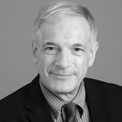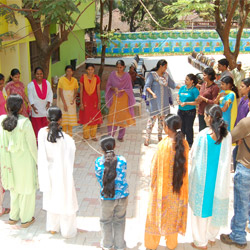PRESIDENT'S ESSAY

MacArthur Foundation Former President, Robert L. Gallucci
Learning for Change
What Makes for Wisdom?
The analysis of intelligence leads to policy and action. Foundations, like governments, sometimes have to take action on the basis of inadequate and incomplete information. Proceeding in uncertainty and ambiguity makes attention to results still more important, and it places a premium on the judgment that comes from sound values, extensive experience, and a willingness to test our cherished assumptions. That is what I mean by “wisdom.” I do not pretend that foundations have access to a hidden cache of truth, but that our staff and grantees have a collective sense of the fields in which they work that, while hard to describe, gives them an intuition for an opening, a change in direction, or a new road to long-held goals.
Lessons learned in one area of work can translate to others… Apparent failures can be success by another route.
A recent example: for more than a decade, the Foundation has worked to preserve affordable rental housing across the United States. Most of this housing is in private hands, run by owners who depend on a network of subsidies and special financing arrangements. It was our first instinct that reducing energy costs in these properties would benefit owners, who work within tight profit margins and make them less likely to sell or redevelop the properties.
As we looked more deeply, we found changes in how the built environment in America was being managed. Local authorities, the capital markets, and federal agencies were evidently intending to regulate energy efficiency in various ways, but without attention to how this would affect affordable rental housing—the part of the housing stock where profit margins are slim and owners subsidized in various ways. We realized that affordable rental housing needed to be put into the center of this policy debate. The goals of our strategy were that the new regulations should, at least, not damage the sector; to look for benefits from the new resources being made available for energy upgrades; and to share what we had learned in supporting early efforts to audit how energy was used in multi-unit buildings and retrofit them to be more energy efficient.

Sangath is committed to improving health and focuses on child development, adolescent and youth health, and mental health in Goa, India.
Lessons learned in one area of work can translate to others. Not long ago, we decided that we added no special value in traditional school reform, and we brought our work to a close. Yet from it we learned ways to influence social systems that suggested how we should approach our then-nascent work in juvenile justice reform. We turned from offering a model of reform to harnessing and accelerating reform already underway, resulting in stronger partnerships and more progress toward a shared ideal.
Apparent failures can be success by another route. Some years ago, we established a research project in Melanesia designed to help local communities manage their marine resources more efficiently. Our goal was to understand what conservation techniques fishing villages could implement that would lead to more sustainable harvesting. Very soon, the program was in demand across the region and the number of communities taking part made the intended research impossible. But we had a direct influence far wider than we could have hoped.